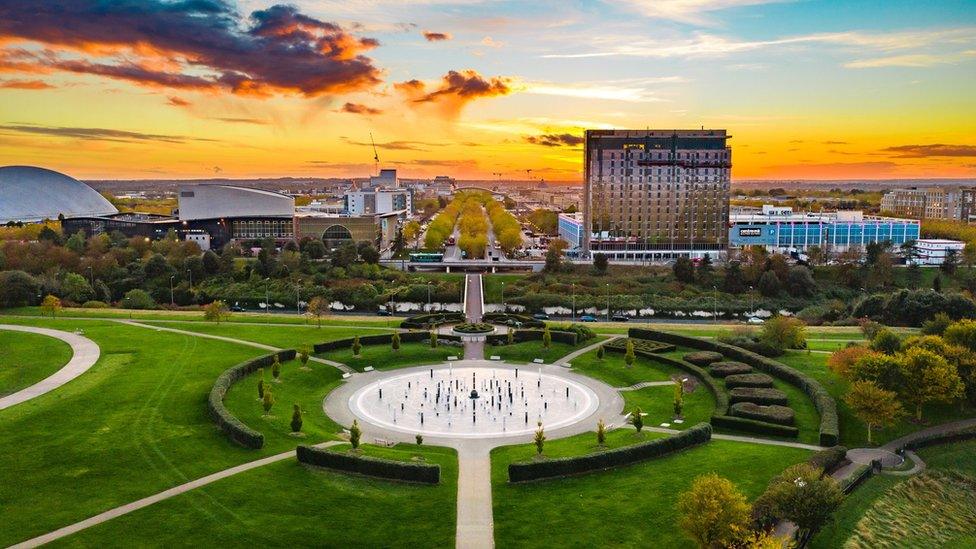Local Elections 2023: Milton Keynes in four graphs
- Published

This year's elections cover all 19 city council wards with one vacancy in each ward except for the Central ward where two seats are up for grabs
With a budget of more than £630m, the unitary Milton Keynes City Council runs a vast range of services from social care, to bin collections to education. This year's elections cover all 19 city council wards with one vacancy in each ward except for Central ward, for which two seats are up for grabs.


No single party has a majority on MK City Council.
While the Conservatives are the biggest single group, the authority is run by a Labour-Liberal Democrat coalition known as the "Progressive Alliance".
Labour leader Pete Marland has led the council for eight years.
He said his priorities for the May elections were the cost of living crisis, access to GP appointments and tackling crime. "That's what overwhelmingly comes up on the doorstep," he said.
The city's population grew more than 15% between 2011 and 2021, to around 287,000. England's population rose by 6.6% during the same period.
Mr Marland said he wanted the city "to grow in the right way with the right infrastructure and with the best tradition of Milton Keynes, which is population growth that goes hand in hand with economic growth that benefits the existing population".

The Milton Keynes economy has also performed strongly. Data from the Office for National Statistics, external show the value of goods and service produced in Milton Keynes grew from from £8.7bn in 2010 to £14bn in 2020.
But how much credit can Mr Marland and his party take for that?
"When we took over the council I think the council had a reputation for being a bit of a basket case," he said.
"It was difficult to get planning permission, everything was an argument. It's about tone and it's about selling the place."
Robin Bradburn, leader of the Liberal Democrat group, said he would be happy if his party picked up two seats on election day, perhaps with "borrowed votes" from Conservatives who have been "alienated" by their party.
He added: "It's never been more important to have strong local government because we are the only filter and support that residents have against a dysfunctional government that's caused more concern and hardship than any government since the Second World War."
He said that the cost of living was often raised as an issue on the doorstep.
"The alliance with Labour has been very good," said Mr Bradburn. "We have been able to protect the most vulnerable within the confines of the budget set by central government.
"I think we're in a reasonably good position to either hold our own or even take a couple of seats," he added.
Created as a new town in 1967, Milton Keynes was officially made a city in February during a special ceremony attended by King Charles III.
David Hopkins, who leads the Conservative group on the council, said "planning and growth" were the issues most often raised with him by residents.

He said if Milton Keynes continues to grow at a similar pace, 3,000 new homes could be built a year between 2025 and 2050, meaning 75,000 new dwellings in total.
"That's another Milton Keynes," he said, adding that the council "will have to create a new city" and "somebody has to come clean about that".
He said if his party won power, it would not necessarily slow the pace of growth but would work more closely with its neighbours on where growth should go.
"We have to start talking to Oxfordshire, Central Bedfordshire [and] the two Northamptonshire councils about how we can share out this population growth and all the benefits that come with it," he said.

And what about the Conservatives' chances on election day?
"I would be lying if I said this is a great opportunity for us," he said, adding that 13 years into a Conservative-led government is a "very challenging time" for his party.
But he continued: "We're in a period of recovery and consolidation. Rishi Sunak is proving to be a first-class prime minister and he seems to have Labour worried."
The Green Party is contesting 15 of the seats up for election.
Alan Francis, of the Milton Keynes Green Party, said: "We want to get representation on the council and to make Milton Keynes a greener place.
"In terms of the council's green policies, they tend to be put down on paper rather than put into practice."
He said key Green Party policies for the city included improving provision for walking and cycling, lowering speed limits to improve safety and air quality and to slow the rate of housing growth in the city.
Mr Francis said the current rate of growth did not include adequate affordable housing and put too much strain on infrastructure such as roads, the sewage system and health services.
"The growth in Milton Keynes should satisfy the needs of the families that are here," he said.
A full list of candidates standing for Milton Keynes Council is available here, external.



Find BBC News: East of England on Facebook, external, Instagram, external and Twitter, external. If you have a story suggestion email eastofenglandnews@bbc.co.uk, external